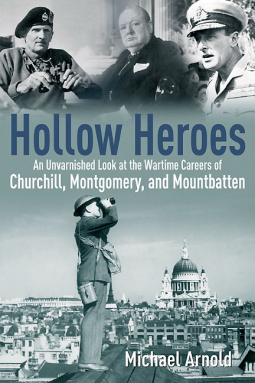Please wait... This may take a moment.
HOLLOW HEROES
An Unvarnished Look at the Wartime Careers of Churchill, Montgomery and Mountbatten
This title was previously available on NetGalley and is now archived.
Pub Date
Dec 18 2014
| Archive Date
Feb 20 2015
Description
The book reveals the truths behind the conventional images of three of Great Britain's primary military leaders during and immediately after the Second World War. In each case there was a totally different side to each man, which demonstrates that a great deal of their reputation was built on contrived results, deception and dishonesty.
It examines the influence and impediment of “class” on the performance of the British Army in World War II, and quotes the views of the Americans that far too often there was an unwillingness among the British to base officer promotion on effectiveness rather than on social background; conforming was more important than performing, as anyone who has served in the British Army’s ranks would agree. At the same time, Montgomery feared and was jealous of Patton, whose rate of advance was nearly always twice that of Monty’s.
The services of Field Marshals Wavell and Auchinleck, two of Britain’s finest commanders of the war, were largely lost to Britain because of Churchill’s consistent interfering in field matters and his need to contrive almost anything to remain in power after he had been responsible for the fall of Singapore.
This book includes the bizarre case of Major-General Dorman-Smith, one of Britain’s most brilliant original thinkers, who without reason was sacked by Churchill. Dorman-Smith was the tactician who had produced Britain’s victory over Rommel at the first battle of Alamein, but his crime seems have been overachievement; an unforgivable sin in some eyes. Mountbatten’s fumbling in India is also realistically portrayed in these pages, putting paid to the “man for the century’s” overly embellished reputation.
The book reveals the truths behind the conventional images of three of Great Britain's primary military leaders during and immediately after the Second World War. In each case there was a totally...
Description
The book reveals the truths behind the conventional images of three of Great Britain's primary military leaders during and immediately after the Second World War. In each case there was a totally different side to each man, which demonstrates that a great deal of their reputation was built on contrived results, deception and dishonesty.
It examines the influence and impediment of “class” on the performance of the British Army in World War II, and quotes the views of the Americans that far too often there was an unwillingness among the British to base officer promotion on effectiveness rather than on social background; conforming was more important than performing, as anyone who has served in the British Army’s ranks would agree. At the same time, Montgomery feared and was jealous of Patton, whose rate of advance was nearly always twice that of Monty’s.
The services of Field Marshals Wavell and Auchinleck, two of Britain’s finest commanders of the war, were largely lost to Britain because of Churchill’s consistent interfering in field matters and his need to contrive almost anything to remain in power after he had been responsible for the fall of Singapore.
This book includes the bizarre case of Major-General Dorman-Smith, one of Britain’s most brilliant original thinkers, who without reason was sacked by Churchill. Dorman-Smith was the tactician who had produced Britain’s victory over Rommel at the first battle of Alamein, but his crime seems have been overachievement; an unforgivable sin in some eyes. Mountbatten’s fumbling in India is also realistically portrayed in these pages, putting paid to the “man for the century’s” overly embellished reputation.
Advance Praise
No Advance Praise Available
No Advance Praise Available
Marketing Plan
• Trade, library and direct-audience review mailing
to local, regional and national
publications
• Catalog and website advertising
• Direct-mail and internet promotion
• Simultaneous launches in the US and UK
• Sales presentations to all major chain stores,
select local bookstores, national catalog
booksellers
and book clubs
• Trade, library and direct-audience review mailing
to local, regional and national
publications
• Catalog and website advertising
• Direct-mail and internet promotion
• Simultaneous...
Marketing Plan
• Trade, library and direct-audience review mailing
to local, regional and national
publications
• Catalog and website advertising
• Direct-mail and internet promotion
• Simultaneous launches in the US and UK
• Sales presentations to all major chain stores,
select local bookstores, national catalog
booksellers
and book clubs
Available Editions
| EDITION |
Hardcover |
| ISBN |
9781612002736 |
| PRICE |
$34.95 (USD)
|
Additional Information
Available Editions
| EDITION |
Hardcover |
| ISBN |
9781612002736 |
| PRICE |
$34.95 (USD)
|
Average rating from 5 members




